Looking for a good overview of all OpenSea fees?
Or maybe you’re just confused about which actions will incur OpenSea NFT fees and which won’t?
Well, you’ve come to the right place because we’ve done the digging for you and have stripped out all the nonsense and made it crystal clear for you here.
In this guide, you’ll learn everything you need to know about OpenSea fees, including what types of fees exist, which fees go to OpenSea, and who pays what.
So it’s more about “How much does OpenSea charge?” and now so much about the cost associated with creating NFTs.
If you’re just looking to find out the cost to make an NFT, then we recommend checking out our detailed guide on “How much does it cost to create an NFT“.
Either way, next time someone asks you about the OpenSea fees involved with creating and trading NFTs, you’ll have tons of knowledge to share with them.
Key Points (tl;dr)
- There 3 different types of fees on OpenSea: Service fees, creator royalties, and transaction fees.
- OpenSea’s service fee rate is 2.5% and applies to all sales volume.
- Creator royalties are defined by the creator but are usually capped at 10% on OpenSea.
- Transaction fees are incurred on most trading activity and will largely depend on the current Ethereum gas price.
- There are some gas-free actions on OpenSea, however, they are mostly limited to creating new NFTs.
Like this content? Then share it!
OpenSea Fees: Everything You Need to Know
www.tokenizedhq.com
Here’s the answer. Great article by @ChrisHeidorn right here: https://tokenizedhq.com/opensea-fees/
OpenSea Fees by Category
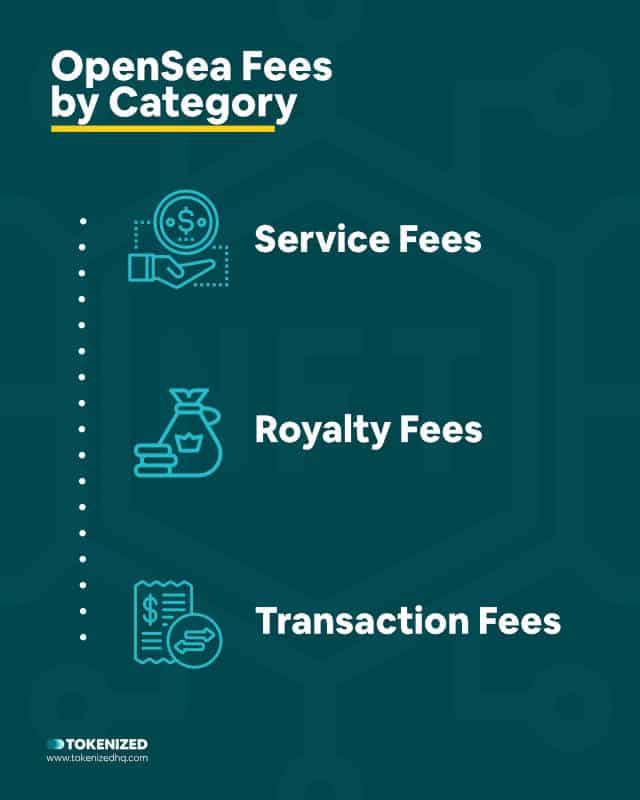
Before we dive into all the nitty-gritty details of who pays what, how much and for which type of action, let us first have a quick look at what sort of OpenSea fees even exist.
This is crucial because despite what many may think, not all fees are the fault of OpenSea.
Some of the fees incurred when dealing with NFTs are controlled by the creator of a project or are simply the cost of doing business on the Ethereum blockchain (see gas fees).
You can break down the different types of NFT fees into 3 broad categories:
- OpenSea Service Fees
- Creator Royalty Fees
- OpenSea Transaction Fees (gas fees)
What Are OpenSea’s Service Fees?
OpenSea’s service fee is currently 2.5% of the transaction volume. That means that every time an NFT is sold on their marketplace, they receive 2.5% of the sales prices as revenue. Service fees are usually paid by the seller of the NFT.
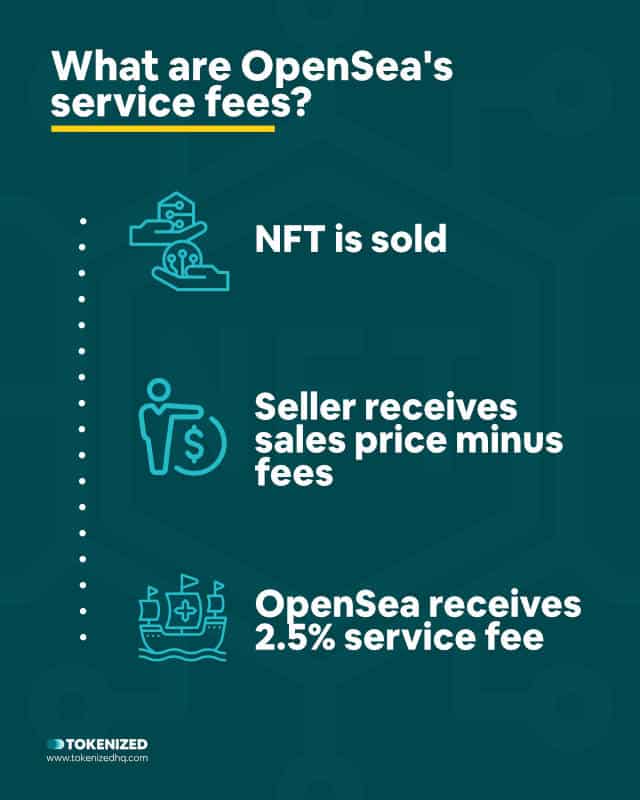
Despite all the complexity of crypto, smart contracts, and NFTs, OpenSea’s business model is actually quite simple.
They are an NFT marketplace, so they bring together buyers and sellers.
There’s value in doing so because despite all the hype the market for NFTs is very illiquid, which means it’s not necessarily easy to sell an NFT once you’ve purchased it.
The fees they charge for providing this “service” are 2.5% on each transaction and these OpenSea selling fees are always paid by the seller.
Now, 2.5% may not sound like much, but when you effectively control >90% of the market, it still adds up because you can reasonably expect the same items to change hand multiple if not even dozens of times and they take their 2.5% cut every time.
Nevertheless, this is the only “margin” that OpenSea actually takes.
One of OpenSea’s biggest contenders is LooksRare, which has not only taken a community-first approach with its LOOKS token but also has a lower service fee of only 2%.
What Are NFT Royalty Fees?
NFT royalty fees (or royalties for short) is the percentage of the sales price which is paid to the original creator of the NFT or project. The percentage of creator royalties can vary and are set by the creators themselves. However, on OpenSea creator royalties are capped at 10%. These royalties are paid by the seller of an NFT.
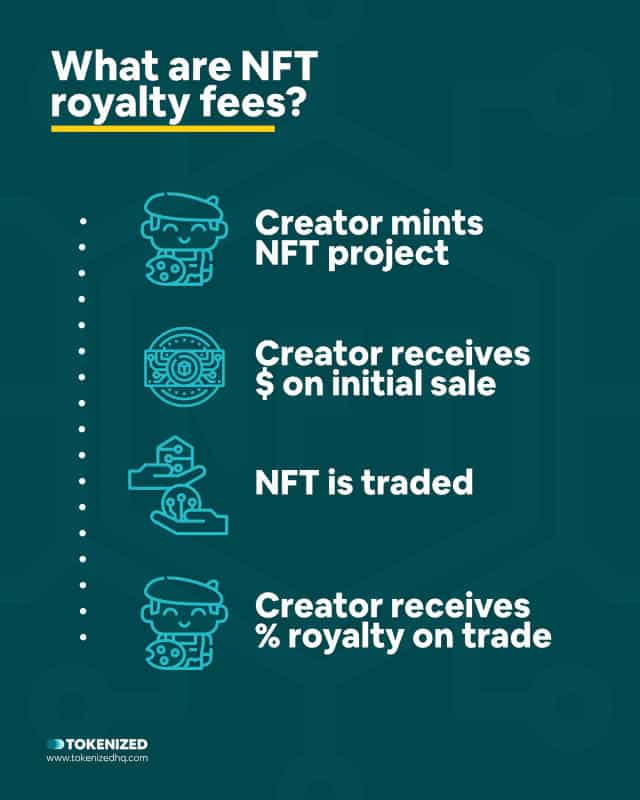
One of the big advantages of NFTs in this new exciting Web3 world is that unlike in traditional art, the original creators can set up a royalty fee of their choice.
That means that every time their work is traded, they can ensure that they always get their cut of the transaction.
This is fundamentally different from how the classic art trade works, where the original artist is usually cut out of this process and never actually receives any monetary compensation when someone re-sells their artwork for millions.
Similarly, music artists used to depend on big music labels to publish and market their work at the expense of a huge chunk of their royalties.
Most artists would end up with pennies on the dollar and unless they became true superstars, it was difficult for them to make a living.
With NFTs, this changes dramatically because, in theory, the creator can choose whatever royalty he or she wants.
In the case of OpenSea fees, however, the maximum royalty that you can set it capped at 10%.
This cap makes sense because too high royalties can easily stifle trading activity, which obviously isn’t in OpenSea’s interest.
Either way, rest assured that these OpenSea royalties are going back to the original creator, not OpenSea.
Rarible royalties work very much the same way except for a few minor differences in what you can do.
Many creators have asked about the ability to split creator royalties amongst multiple addresses.
While this is theoretically possible and simple requires someone to develop a smart contract that supports this, it is currently not supported by OpenSea.
Which Transactions Cost Gas Fees?
All NFT transactions which involve writing data to the Ethereum blockchain cost gas fees. The only difference is that some of paid by the buyer and others are paid by the seller. Usually, it will depend on which party is initiating the completion of the transaction.
The biggest challenge with OpenSea NFT fees on right, or any other NFT websites for that matter, are the extremely high gas fees.
The majority of NFTs are currently minted on the Ethereum blockchain, which still uses a proof-of-work consensus mechanism.
While proof-of-work is considered very secure, it’s unfortunately also very inefficient and thus creates a supply and demand problem.
When using OpenSea to create, list, buy or sell NFTs you will incur various different types of transaction fees, which are simply the cost of doing business on Ethereum.
These fees can be categorized into 2 simple groups:
- One-time fees
- Recurring fees
Rarible Analytics actually shows live data on Rarible gas fees and we’d assume they are similar to what you’d incur on OpenSea as well.
We also have a dedicated page on OpenSea gas fees, which includes a detailed infographic showing which types of actions cost fees and which ones are free.
What Are OpenSea One-Time Fees?
One-time transaction fees on OpenSea include initializing an account for a new wallet address and approving transactions for a specific token or smart contract.
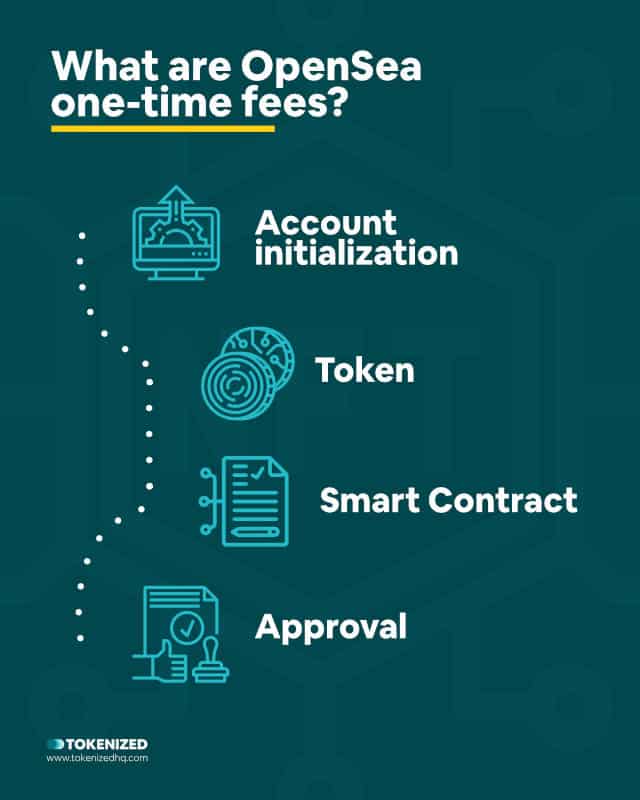
There are only 2 cases where you will incur one-time OpenSea fees.
Whenever you use your OpenSea wallet to list an NFT on its storefront for the first time, you have to pay account initialization fees.
This is necessary so that OpenSea’s platform can transact with your wallet as a seller and complete a sale when necessary.
Bear in mind that this ONLY applies if you want to list something, but not if you are simply buying.
The second case where you will incur fees is when you list a particular token or contract for the first time.
You will literally have to do this for every new project that you list.
So, if you wanted to list 3 Bored Apes that you own, you’d have to pay fees for the initial approval of the first one, but not for the other 2.
So, technically there are no OpenSea listing fees per se.
Now, bear in mind that if you revoke those permissions at any time, you will have to pay again when decide to re-list them.
The fees will vary greatly depending on the current level of gas fees in the network.
What Are OpenSea Recurring Fees?
Most of the transactions on OpenSea which involve listing, selling, transferring or bidding on an NFT involve recurring fees. Other recurring fees include converting between ETH and WETH, bridging funds to Polygon, or freezing the metadata of an NFT.
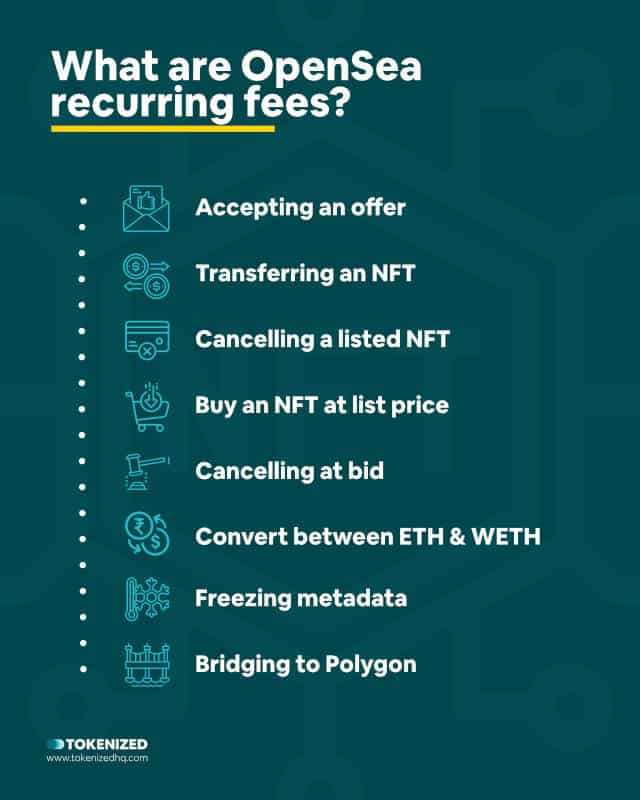
Aside from the one-time OpenSea NFT fees, there are also recurring fees that you incur for all sorts of transactions that you might do on the website.
These mostly depend on whether you are acting as the buyer, seller, or whoever initiates the final decision for a purchase.
These transactions include…
OpenSea Gas Fees as the seller:
- Accepting an offer (read our guide How to Accept Offer on OpenSea)
- Transferring an NFT to someone
- Canceling a listed NFT
There have been recent reports of stolen NFTs on OpenSea due to users forgetting to cancel old listings at very cheap prices. So a popular question right now is: Is OpenSea safe? Yes, it is. However, please be vigilant and make sure you don’t have any open listing you don’t know of. Learn how to delist on OpenSea properly.
OpenSea Gas Fees as the buyer:
- Buying an NFT at the list price
- Canceling a bid
Everyone:
- Converting WETH back to ETH or the other way around (check out our guide on OpenSea WETH for details)
- Freezing an item’s metadata
- Bridging ETH or withdrawing ETH to and from Polygon (we also have a guide on fixing the common Unlock Currency OpenSea error)
Are There Any Gas-Free Actions on OpenSea?
Yes, there are gas-free actions on OpenSea. They include “lazy minting” an NFT, creating a collection, listing an NFT at a fixed price or auction, and reducing the price of your listing.
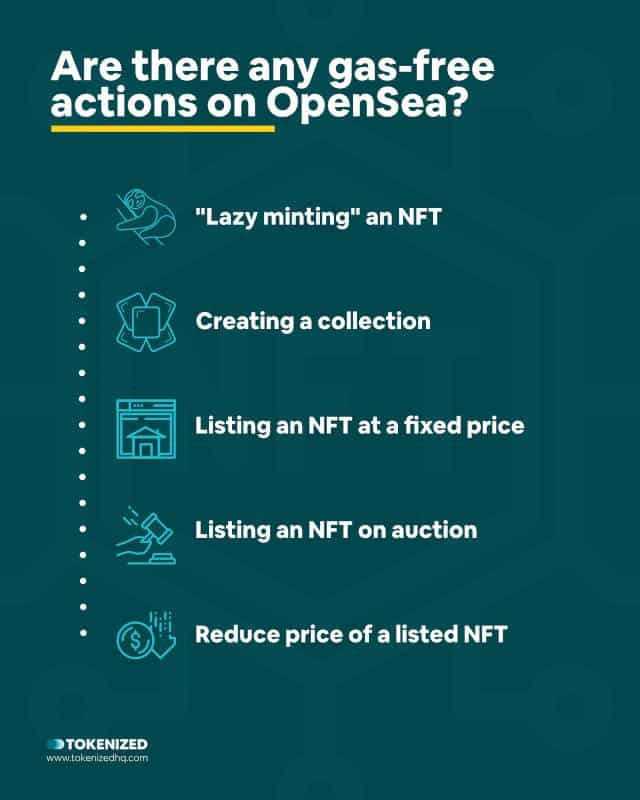
While it may seem like literally everything costs money on OpenSea, there are a number of actions that are free of gas fees.
- Creating an NFT (getting an OpenSea failed to fetch error?)
- Minting a new NFT via “Lazy Minting”
- Creating a collection
- Listing an NFT at a fixed price
- Listing an NFT on auction
- Reducing the price of an NFT you’ve listed
That last point might annoy you because OpenSea doesn’t allow you to raise the price without first canceling the listing.
Obviously, this is meant to discourage price raises and will ultimately drive sales volume, which is how OpenSea makes its money.
Frequently Asked Questions (FAQ)
Before we wrap up, let’s quickly address a few frequently asked questions that many people have in relation to OpenSea fees.
-
How much does OpenSea cost?
OpenSea charges a 2.5% service fee on all NFT sales that are processed via their platform. You also may have to account for additional royalties that are paid out to the creator of the NFT collection. Royalties are usually within the range of 2% to 10%.
-
How much are gas fees for OpenSea?
Gas fees for various different types of actions on OpenSea fluctuate based on supply and demand on the blockchain network that you are using. This is particularly important on the Ethereum blockchain which is frequently congested due to excessive demand.
-
Is selling on OpenSea free?
You can list NFTs on OpenSea for free. However, once a sale is successfully completed, you’ll be charged a service fee of 2.5% on the transaction.
Conclusion
So, as you can see, even though it’s not necessarily all self-explanatory, it’s also not extremely complicated.
And despite the fact that OpenSea is obviously trying to generate as much revenue as they can, not all of the fees are their fault.
There is no such thing as an OpenSea gas fee, but rather the fees for completing a transaction which for the most part will be the same on every other NFT art marketplace.
This is especially true for NFTs which are still relatively inexpensive, but all the more true for blue-chip projects which can easily sell for tens, if not hundreds of thousands of dollars.
We hope we were able to shed some light on the topic and give you a useful overview of the fees associated with NFT trading and minting.
If you found this article useful, please do share it.
Here at Tokenized, we want to help you learn as much as possible about the coming NFT revolution. We help you navigate this fascinating new world of non-fungible tokens and show you how you can integrate tokenization into your own business.



